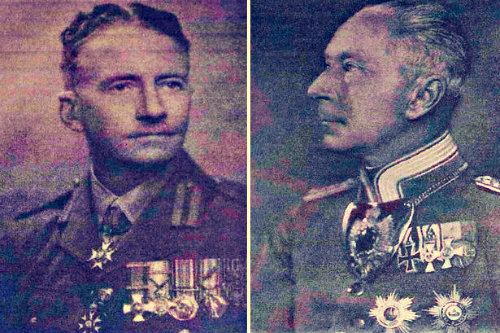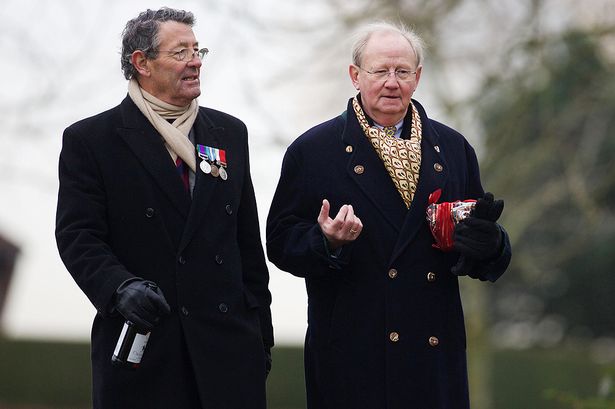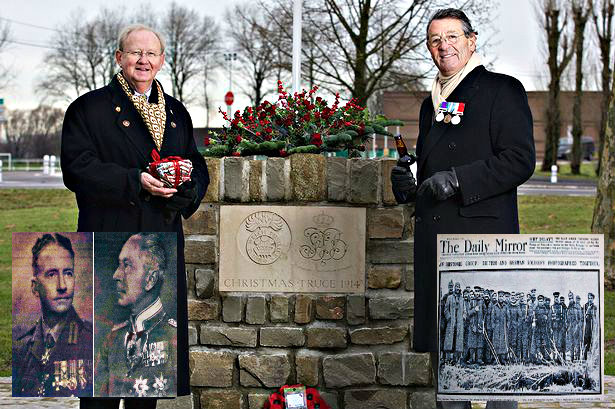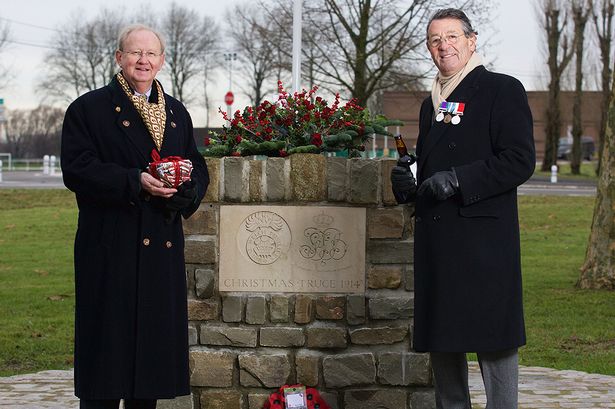One hundred years ago, instead of killing each other as they were ordered to do, British Captain Clifton Stockwell and German Baron Maximillian von Sinner instead had a toast at the midst of the Great War. A century past, their grand-kids – both involved in military service – met in the same spot to commemorate their grandfathers’ action.
The Orders
On Christmas morning some ten decades ago, two men from the Great War’s warring parties were commanded to kill each other. However, when they met on No Man’s Land, no blood was shed. Instead, they exchanged gifts of plum pudding and shared beer.
The guns fell silent that day as British Captain Clifton Stockwell and German Baron Maximillian von Sinner negotiated for a truce lasting for a day all the while toasting each other’s good health.
Soon after, the two parties were engaged in a game of football with the British troops being trashed by the Germans when it came to goals. Meanwhile, the officers smoked cigars and talked to each other showing to each other pictures of their families back home.
The 1914 ceasefire occurred Frelinghien in northeastern France. Starting at exactly eleven in the morning on Christmas day that year, a German soldier started it by walking towards the trench of the Royal Welsh Fusiliers with his hands up in the air. A British soldier climbed up to meet that German soldier despite his officers’ attempts to stop him. When they did meet, the German serviceman presented the latter with a box of cigars.
Witnessing the scene unfold, the rest of the Fusiliers, with eagerness, wanted to come up as well. So, Captain Stockwell took upon the task of making contact with the officers of the other side. He called out to them to meet him.
It was Baron von Sinner who answered his call. Upon meeting on No Man’s Land, the two agreed to a truce which would last until midnight. With this agreement, the German soldiers belonging to the 134th Saxon Infantry rolled out three barrels of beer – taken from a nearby French brewery – and shared them with the British troops.
Both sides went on to make large banners wishing each other to have a merry season which they, then, put up just above their trenches.

Great War ended with both Stockwell and von Sinner surviving. Nevertheless, they never told their families about that particular occurrence. Stockwell just wrote about it in his war diary. This same journal was eventually used by the Royal Welsh for the compilation of its regimental history.
Aside from his account about the truce in his journal, it is also believed that Stockwell wrote this poem alluding to that one-day truce on Christmas day of 1914. Entitled Christmas 1914, it goes as follows:
Twas a frosty Xmas morning
In our trenches on the Lys
And a fog was hanging thick along the fields
You could hear the Bosches singing
But no Xmas bells were ringing
’Cept the tinkle of the bullets on shields.
When the fog at last had lifted
And the Bosches glances shifted
On our parapet in front of them they saw;
On a notice board in writing
From the men that they were fighting
“Merry Xmas” and Kaisers heads galore.
Then the Bosches started shouting
“Will you come and take an outing?”
And a row of heads along our line appear
For two Saxons greatly daring
To our trenches were boldly faring
With a barrel of the most indifferent beer.
Thus when after-dinner came
Both sides did more of the same
And their trenches boldly left and came abroad
And with barrels full of beer
And something of good cheer
Made an effort to arrive at an accord.
Then the officers conferred
While our rations were transferred:
To a truce between the two they did agree,
That till dawn the following day
None should shoot or forward stray
Whilst our notice board the enemy could see.
The Comeback
A century after that Christmas truce, the grandsons of the two officers returned to the same spot were they stood, conversed and toasted beer bearing the same items their grandfathers brought that day — beer and plum pudding.
71-year-old retired British Major Miles Stockwell and 63-year-old retired German Colonel Joachim Freiherr von Sinner visited the same location where their grandpas met. Both men had followed in their ancestors’ footsteps and had served in the respective military organizations of their countries.
According to Miles, who also served in the Royal Welsh, the story between their grandfathers was very amazing. They had been strictly ordered never to fraternize with the enemy that was why there were never pictures taken of that day and of the two of them together.
He went on to say that deciding to ignore the orders of the ones above them had been risky but still they pushed forward to meet on the muddy No Man’s Land while their men cheered in the background. Miles added that his grandfather didn’t have anything to give as a peace offering that day, only a plum pudding he had been set so he fetched that and handed it to the German baron.

The latter, on the other hand, had two beers in hand and he gave one to the British captain. They toasted each other’s health, decided on having a short truce, sat on the flat ground drinking from their beer bottles and smoking cigar.
Miles, then, pointed out that this story just goes on to show what possible things happen when people just stop fighting and start talking.
Unknown
While the truce was documented and is celebrated in Britain, it is largely unheard of in Germany.
Joachim, who is a military lawyer with specialization in European military laws, said that he knew nothing about the truce his grandfather had been involved in until a historian called him and informed him about it. His initial reaction to it was shock. He just couldn’t believe that it did occur.
He commented that it must have been hard for the two officers to part ways after the truce and start shooting at each other again. After all, more than sharing beer, they did talk about their families and even showed photos to each other. After the ceasefire, they knew that if the other was killed, the first to get affected was the family.
However, he thanked his grandfather’s decision that day. According to him, if not for the two officers reaching that agreement one hundred years ago, both he and Miles wouldn’t be meeting in the same spot not as enemies but as friends.
Similar Truces that Christmas Day
That plum pudding giving and beer sharing truce in Frelinghien wasn’t a solitary occurrence. Three hundred meters away from where the Royal Welsh Fusiliers were, the Scottish Seaforth regiment and the 133rd Saxon regiment reached a similar ceasefire pact. As a matter of fact, both units had a football match using caps as their goalposts. The Germans later on recorded the event in their diaries particularly noting that the Scots did not wear underwear underneath their kilts making themselves exposed to their opponents with every kick they made.
Kick-abouts were a common occurrence among soldiers who were in the front lines. If there was no ball, a rolled-up jacket or a tin can was used in its place. Nevertheless, that particular game between the Scots and the Germans was the only one well documented with the score recorded as “3-2 to Fritz”.
Each truce which occurred during that time were varied depending on their locations. Some used the ceasefire as a chance to give their dead decent burials, hold a Christmas service or exchange gifts of ale, chocolates and tobacco.
On the north of Frelinghien, British and German soldiers roasted a pig. Further along the front lines, there was entertainment provided in the form of a German juggler and a British soldier in skirt which he had found in an abandoned farmhouse.
There was also an account recording how a British serviceman took off two buttons from the coat of a German officer as a souvenir and another telling how a barber gave haircuts to soldiers coming from both sides.
John Krijnen, a historian and the one who contacted both Captain Stockwell and Colonel von Sinner, said that at that point, there was no hatred between the troops that was why both German and British soldiers were only too happy to fraternize with each other. Usually, the truces went from Christmas to Boxing Day but some did last until the beginning of January.
Understandably, both sides were reluctant to go back fighting after enjoying camaraderie with each other even if it was for a short time only. Krijnen, then, added that when the top brass noticed this, those British battalions who took part in the truces were relieved from the lines on Boxing Day and were replaced with soldiers who knew nothing about their occurrence so that further friendships with the warring side could be stopped.
In Memory
Both Miles and Joachim met on the same spot their grandfathers did one hundred years ago. And in remembrance of their ancestors’ agreement with each other, both men gave each other a plum pudding and a bottle of beer.
Furthermore, Frelinghien town officials reopened a short section of the trench where the Scots played football with the Germans which they had rebuilt. Finally, soldiers belonging to the Royal Welsh and the Panzergrenadier Brigade, the same units that met and had a truce that Christmas day a century ago, serenaded each other with Christmas songs and played a football match. The Germans won again, this time 3-0.
One Time Event
Unfortunately, though, Christmas Truce 1914 was a one-time event.
According to Mr. Krijnen, WWI high-rank officers were determined not to make a repeat of the series of truce so the following year, strict orders were imposed made easier by a directive for a brutal barrage come Christmas morning.
That one-timeness of the truce in 1914 paved its way for a special place in war history.

